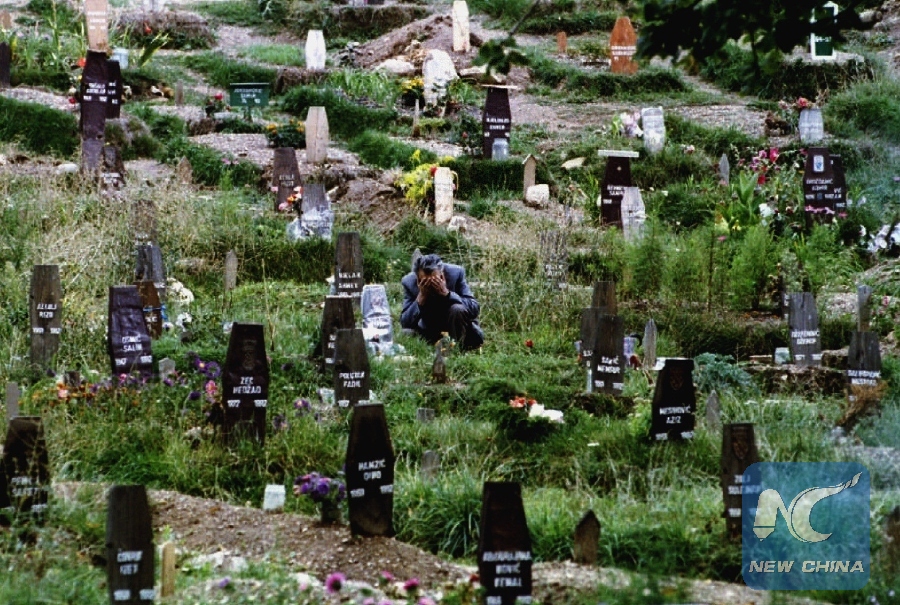
A Bosnian man in a cemetary cries over the grave of his wife in Sarajevo in this Sept. 8, 1993 file photo. The United Nations war crimes tribunal handed down its verdict in 2016 in Bosnian Serb leader Radovan Karadzic's trial for genocide during Bosnia's 1992-95 war. (Xinhua/REUTERS)
by William M. Reilly
UNITED NATIONS, June 19 (Xinhua) -- "I was a child with three identities," a 25-year-old man abandoned at birth by his rape-victim mother during the 1992-1995 Bosnian War said Tuesday when recounting his personal struggle to overcome the social stigma against him.
Speaking at an event at the UN Headquarters marking the International Day for the Elimination of Sexual Violence in Conflict, Alen Muhic of Sarajevo, Bosnia and Herzegovina, told reporters that he now understood his birth-mother's decision and was gratified by the love of his adoptive family.
He told how he was abandoned by his biological mother two days after birth but was adopted seven months later by the hospital janitor, who had a loving wife and two daughters. He said they became his true family.
Since his biological father was unknown by the hospital at the time of his birth, he was given three names.
"Was I Bosniak, was I Croat or was I Serb?" Muhic said. "So, I was given three different names. Effectively I was a child with three identities."
In a message marking the day dedicated to wartime sexual violence victims, UN Secretary-General Antonio Guterres said that children born to wartime rape victims often struggle with issues of identity and belonging for decades after the guns have fallen silent.
On this day, "we amplify the voices of these forgotten victims of war, who suffer stigma, shame and exclusion in societies polarized by armed conflict," said the UN chief.
Just like most children born of rape, Muhic had an uneasy childhood, filled with memories of name-calling by neighborhood children and classmates. But he nevertheless managed to survive such plights, with the help of his loving adoptive family.
He also made peace with the fact that his mother did not have much choice back then.
"I could not judge her. I am not sure what I would have done if I were in her place. So I completely understood that she needed to move on," he said.
Muhic's feelings for his father were totally different.
"I met him. Even in spite of the recognition of the war crime and being prosecuted for it, he still denies it," said Muhic. "For me that's something I cannot really understand because we all make mistakes but we move on and live with it. But he's still not able to admit what he has done and the wrong that he has done to my mother."
Muhic discovered his birth mother and father after he was featured in documentaries. "It really helped me deal with everything life has given me," he said of the films.
The Bosnian War is considered the most devastating conflict in Europe since the end of World War II. During the four years of the war, some 100,000 people were killed, over 2.2 million displaced, and an estimated 12,000-20,000 women raped.
Muhic now works as a medical worker in the same hospital where he was born. He married a co-worker a few years ago, and now their son is 2 years old.
"All I can say is I am so grateful to my (adoptive) parents who have given me everything," Muhic said. "I am grateful for all the love and being part of the family and one day when they are gone there will be a huge part of me that will go forever."

